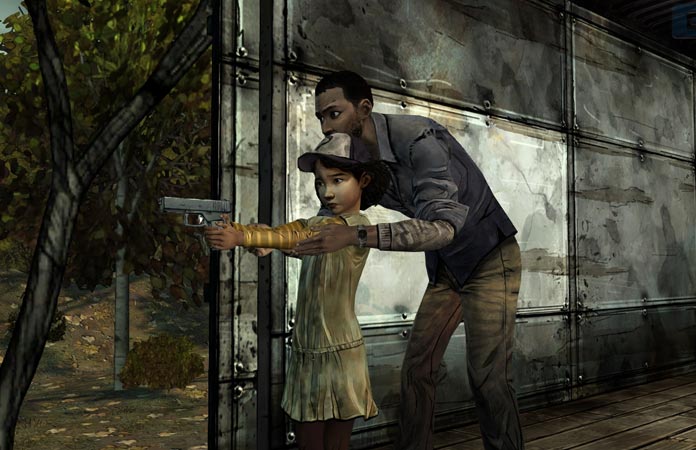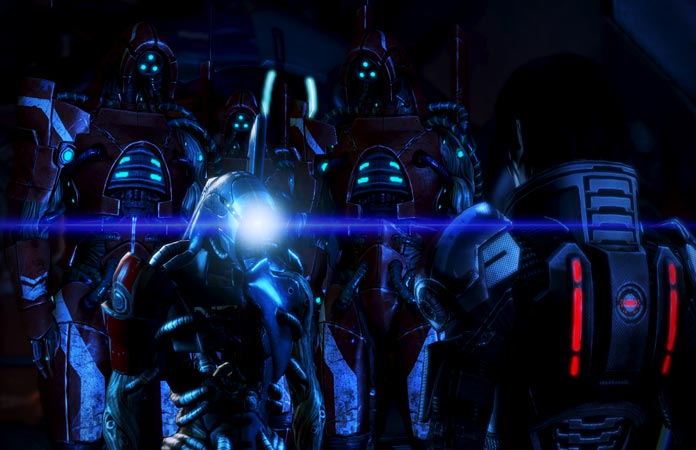Choice In A Virtual World
Published on January 24th, 2013 in: Gaming, Over the Gadfly's Nest |By Paul Casey

The Walking Dead
Please note that this article contains spoilers for both The Walking Dead and Mass Effect 3 games.
Morality may consist solely in the courage of making a choice.
—French Prime Minister guy (Léon Blum)
I have written a bit before about choice in video games, but the last year has again shown how divided the video game community is over this issue. Two games in particular have revealed a particularly ugly limitation among those who play video games: The Walking Dead and Mass Effect 3. This limitation manifests itself through the player failing to engage morally or philosophically with a game unless doing so opens up different content. For a disturbing amount of people, moral choices in video games are simply a euphemism for branching gameplay.
Branching gameplay is exemplified by Quantic Dream’s Heavy Rain. “The player dictates the story told and every choice matters!” The player generally sees “every choice matters” to mean “every choice will branch the story in different ways.”
Phill Cameron from Eurogamer touched on some of this recently while discussing Telltale’s The Walking Dead:
“But the more that the biggest games are starting to offer you narrative choice, the louder the uproar of demand that such choices have to matter, that if I don’t see a clear and tangible, not to mention nigh on immediate, consequence to my actions, then I might as well not put the disc in the machine.”
While Cameron encapsulates the main problem here, his argument simply re-positions the kinds of change that the player should want to see in a game. Cameron misses the most egregious error in the view that every choice, moral or otherwise, needs to have consequences that the player can (immediately) perceive. Choices in life, and certainly those where morality weighs more heavily in judgment, do not always have clear consequences. It is fairly common and easy for a person to commit some crime or transgression and not only fail to be punished for it, but to never become aware of what the consequences really were. Likewise it is entirely possible to do someone a good turn and never feel any reward as a result.
It is not enough, then, to point out that The Walking Dead changes in different ways—by altering the relationships which the player has in the game—but that the pursuit of change in story is not necessarily helpful when exploring issues of morality. It is starting to become apparent through the work of studios like Telltale Games that this is an outdated remnant of the way video games have historically approached larger issues.
(SPOILERS AHEAD!)
Consider the way in which one of the key choices in the game impacts the ending. You and your group come across a seemingly abandoned car that is filled with food and supplies. Clementine, the girl in your care, tells you she is uncomfortable with stealing this food, as those who own it may return. You can go along with the group in taking the food, or you and Clementine can abstain. When you are confronted during the game’s ending by the man who owned this food, the scene plays out much the same whether you stated your objections or not. The context of the scene, and the journey of the character, are however considerably different. Does the game tell you that the context is different? Not really. You have experienced a different journey, though. Whether you care or not about how your character acts and the kind of decisions you make—even if they may never have consequences—is key to why The Walking Dead is such an excellent game.
The setting of the zombie apocalypse is vital. While there are choices which do branch—changing the dynamics of the group and leading some to live or die—what really matters are those decisions of which both the character and the player are incapable of understanding the consequences. If society crumbles and is in no position to hand out punishment, do moral codes mean anything? Is it worth trying to do the right thing?
It is no mistake that the main interaction in the game is between your character Lee and the girl Clementine, who is left in your care by chance/fate. The Walking Dead, as many have noted, is essentially about the role of the parent. Again, there are some choices that can lead to direct consequences of which the parent is aware. If the child outlives the parent though, so many of those decisions made early on and their consequences cannot ever be understood (unless one believes in some kind of ethereal observance). The Walking Dead is most concerned with these kinds of choices.
In the final moments of the game you should care about how you behaved because you have imprinted it on another being in your care. Perhaps in a future game we will see how Lee’s decisions impact Clementine, but ultimately it does not matter if we are aware of the consequences or not. As a parent, you should know if you tried your best or not, but you’ll never be sure if your best is good enough. For a game like The Walking Dead to reduce this kind of doubt to a branching tree is to pander to the deadheads who see these issues as nothing more than barriers to unlockable content.

Mass Effect 3
This is not to say that the more ambitious branching approach can’t do great things, as seen with Mass Effect 3. While thousands of dismal, teat-sucking, gimme-more goons expressed displeasure at the ending of Bioware’s game because it did not branch sufficiently, they failed to see how many of the decisions did result in different scenarios. These scenarios were mostly, unfortunately for deadheads, reliant on the player caring about whether something was right or not. When committing genocide is not seen as an important choice in of itself then there is little hope. As Bioware and Quantic Dream’s Heavy Rain show, branching storylines can be great fun, but the most important questions which these games tackle are beyond such adaptive trickery. Eventually the player must care what the characters do, not what it results in.
In December, Ken Levine, creative director and co-founder of Irrational Games discussed how Bioshock Infinite will deal with the morality question with Edge Magazine:
“I don’t want to pretend that there’s some giant morality system underpinning [Infinite],” explains Levine. “These choices are meant to be interesting moments with some small payoffs. They’re really about prompting you, not letting you out of the moment, and you saying something in return about who you are. [They don’t lead] to earth-shattering changes. The important part was to make sure that you’re in that moment, that you understood the stakes of that moment, and confronting you with that. We’re not really interested in making a capital M morality system; we’re interested in immersing you in a world of moral complexity, not judging you. They are moments, but I think they are moments made more interesting by those choices.” (emphasis mine)
The issue of free will, in reality, is a problematic one. Whether we have any real choice is up for debate, with some seriously disturbing evidence on the side of “probably not.” It is still important, though, how we feel about this experience, and how we view ourselves as a result. This is where the smart creators and studios are going, and there seems to be an audience for it.
Telltale Games and Bioware have highlighted an unhelpful confusion among some of those who play video games. Unfortunately Bioware see fit to coddle these people, instead of pursuing their own artistic interests, unfettered by focus groups and self-censorship. This may come back to haunt them. Or it may not. We may never know. As with the choices in their games, it matters regardless.
Time limit is exhausted. Please reload the CAPTCHA.